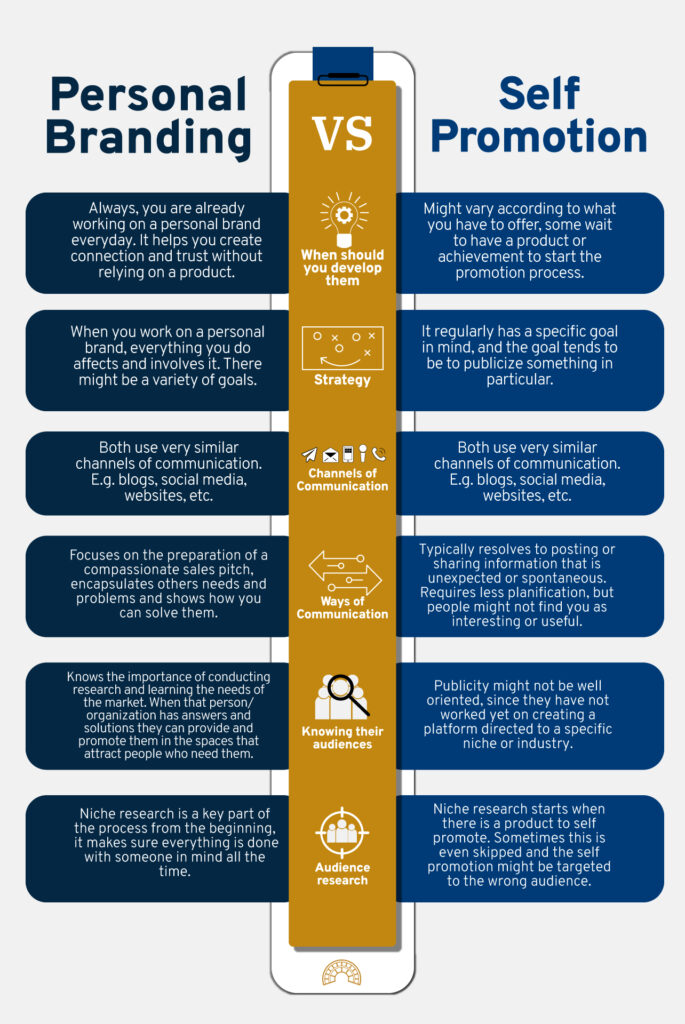To understand the differences between self-promotion and personal branding, it is important to clarify both concepts.
As study.com explains it, self-promotion is “attempting to present yourself to others as accomplished, capable, smart and a skilled person.”
This definition, upon first reading, can be confused with the concept of personal branding, which is the process of building a personal brand.
Self-promotion is a short-term activity. It has a specific goal of showcasing something in particular.
Personal branding is a long-term activity. It is about creating a reputation, a set of thoughts and feelings associated with you.
In this article, you will find the differences and similarities between self-promotion and personal branding through different variables that range from “forms of communication” to “public reaction” and “value proposition.”
Contents
- 1 When Should I Develop A Personal Brand?
- 2 When Should I Self-Promote?
- 3 Personal Brand Strategy vs. A Strategy to Self-Promote
- 4 Channels of Communication
- 5 How To Communicate When Promoting Or Developing A Brand
- 6 Knowing Your Audience
- 7 Managing Public Reaction and Self-promotion
- 8 Having a Personal Brand as a Sign of Competence
When Should I Develop A Personal Brand?
The answer to this is: always!
Since you are already working on it on a day-to-day basis.
For professionals, it can be especially valuable to have a personal brand, since people trust other people more than they trust companies.
When Should I Self-Promote?
The times to do self-promotion will vary mostly according to what you have to offer to your audience.
The biggest mistake someone can make is believing that “showing off” a curriculum, a diploma or a special attribute at just about any time will get people to praise them and be interested in them.
The reality is different from that.
When you have to promote something you made without having a platform to publicize it, you will face the trouble of having to both prove why you are worth trusting and why your product, service, or achievement is worth being interested in.
This overload of personal information can sometimes be mistaken with a sense of “bragging”.
One of the best things you can do to avoid leaving this impression is by having a personal brand, establishing yourself in your niche, and attracting an audience that can be interested in what you have to offer.
Personal Brand Strategy vs. A Strategy to Self-Promote
An important distinction between the processes that involve creating a personal brand or doing self-promotion is in the overall intention and interconnectivity of each action.
When someone self-promotes, it regularly has a very specific goal in mind, and the goal tends to be to publicize something in particular. It can be an achievement (like a graduation or promotion), a product (like a book or an art piece), or a business venture you just started.
However, this can be a separate event from all of the other things you do for your personal image.
On the other hand, a personal brand is a set of ideas, images, and impressions that are interconnected. When you work on a personal brand, everything you do affects and involves it.
For example, every post on social media, every blog article you write, every book you publish, or any video you record. They all fall under the umbrella of your personal brand strategy.
This being said, working on your personal brand requires more preparation of your actions since you reflect on the values and ideas that you want present in the things you do. This results in a sense of unity that makes every new move you make more organic to showcase who you are and what you are capable of.
Channels of Communication
Self-promotion attempts and the maintenance of a personal brand can involve the same channels of communication, such as social media, blogs, or email newsletters.
This is one of the main similarities.
Nevertheless, one channel that is more common among personal branding strategies is a website.
On the other hand, it is important to emphasize that personal brands are becoming the new professional resume.
We are going through the time in history where professionals have the highest level of education. And yet, while that is important in many fields, it is also known that degrees are being less considered as an important factor in many other ventures and jobs.
This is why knowing how to accentuate your best attributes comes in very handy.
Anyone searching for clients and employers will know that social media plays a big part in the process of promoting themselves.
This is why it is so important to create a portfolio or resume on the internet.
Regardless if you are on a self-promotion venture or building a personal brand, letting your online presence be your resume is a great way to make easy access to your achievements, credentials, and overall professional achievements.
How To Communicate When Promoting Or Developing A Brand
The following examples of self promotion showcase an underlying issue in marketing: the invasiveness and randomness of exalting yourself for others interest or approval.
- When you post something on your personal account on your social media sharing a picture of your graduation, and have never worked to brand your page to be oriented towards a particular area or industry, it is most likely that you will be speaking to your family, friends and co-workers.
- The same applies to a very invasive commercial on YouTube or Instagram, since it might appear to anyone, regardless of their level of interest on the topic you promote, a lot of spectators can find it out of place and annoying.
- Even when you go to a networking event: finding just about anyone and suddenly telling them about your accomplishments probably won’t cause the reaction you want from someone you wish to connect to.
Though part of the audience might get excited for you, this act of spontaneous self promotion can also be interpreted in different manners.
The ways in which personal branding handles this better is by focusing on the preparation of a compassionate sales pitch, that encapsulates others needs and problems and shows how you, with your experiences and resources, can solve them.
A psychologist that says “I’ve got a new masters!” is not the same as the one that says “I’ve specialized myself in working with businesses and industrial environments to exploit the strengths of every team.”
Having a personal brand can inform any employer or client that finds you or hears about you how you work: your thought process, your style, your skills, and more. This makes it more attractive and less invasive.
Letting actions speak for you and making channels and opportunities to perceive those actions on their own is key to mindfully promoting yourself.
Knowing Your Audience
Knowing your audience is a key part of self-promotion or personal branding.
Something that seems to be a pattern on those who only self-promote is that they tend to speak to the people closest to them, since they have not worked yet on creating a platform oriented o a specific niche or industry.
This results in promoting your new product to your mom, brother, childhood friend and some coworkers or colleagues from your contact list or social media followers.
On the other hand, the person who works on a brand knows the importance of conducting research and learning the needs of the market, so when that person has answers and solutions they can provide them and promote them in the spaces that attract people who will be best benefitted from them.
Personal branding is great for self-promotion since the work is already done when the occasion to self-promote arises, you only need to show it as part of your brand!
Managing Public Reaction and Self-promotion
When trying to promote your personal strengths or products, putting yourself in the shoes of the spectator is key.
It is important to avoid what experts call “social projection,” or, as psychology.iresearchnet.com defines it, “the tendency to assume that others are similar to oneself.”
One of the biggest mistakes for self-promoters is assuming that just sharing information about themselves out there is enough to attract anyone.
This point connects very well to what I previously mentioned about how to communicate.
Studies have shown that people have tendencies to look down on self promotion since it can be seen as bragging. How do you draw the line between genuine ways to showcase your strengths and being narcissistic?
The answer is: Focus on the other, not on yourself!
The moment we are set to tell everybody around us about something, it is best to ask ourselves the following questions:
- How can this thing about myself help someone else?
- How would they prefer to find out about it?
Remember that all that hard work you have put on yourself and your enterprise is meant to improve people’s lives.
You can start small, working on your social media profiles. And always work to be authentic.
This way, people can connect with you from your humanity and not just any superficial tool or aspect that any other “expert” in your field has.

Having a Personal Brand as a Sign of Competence
Personal branding is the set of ideas and feelings that come to mind with a name.
Working on your personal brand can be very beneficial to creating a reputation that can help you in any job-seeking endeavor or on your business.
Any business will benefit from having directors or employees that are recognized experts in their field.
A restaurant increases its value when its chef is well known, the same applies to a tech company and its engineers and to a marketing company and its designers.
Recent studies and data show that people believe more in other people than companies.
Anyone who learns to use this influence is already one step ahead in the game. Nielsen found out that 92% of people surveyed trust the recommendation of a person more than that of a company advertisement.
Personal branding offers a way for you to master the art of self-promotion in an authentic and genuine way.
Self-promotion and personal branding are two activities with the potential to complement each other, when you are strategic.
Do you want to learn more about this process and take the challenge to take your brand to the next level?
You can book a consulting call with us here.






